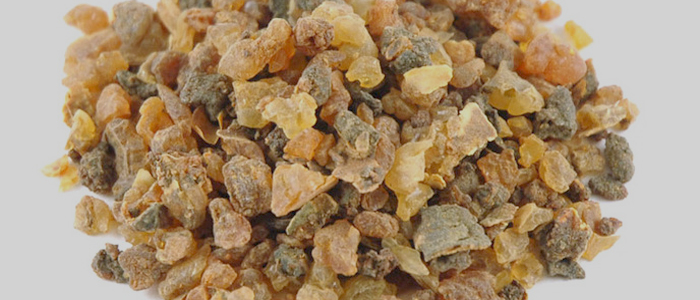Description
Botanical: Commiphora molmol
Other common names: Mo Yao, Makkul, Mukul, Myrrh Tree, Balsamodendron, Commiphora, Molmol, Mirra, Bola
For four thousand years, Myrrh has been known as a powerful natural antiseptic, antibacterial, antiviral, anti-inflammatory and antifungal that combats infections of the lungs, skin and urinary and intestinal tracts. Since antiquity, Myrrh has been used to relieve pain and alleviate sinusitis, gingivitis, periodontal disease and sore throat, and has long been used to help bolster the body's natural immune defenses. Myrrh is also an appetite stimulant and natural deodorizer that can help to sweeten the breath.
Country of Origin: Yemen
Beneficial Uses:
Myrrh treats virtually all upper-respiratory infections and chest problems due to colds and coughs. It is a powerful antiseptic and expectorant, reducing phlegm and congestion in the lungs, and the many volatile oils in Myrrh soothe irritated bronchial passages and promote free breathing during congestive colds by clearing mucus-clogged passages. Myrrh is an herbal decongestant that stimulates and tones mucous tissue, increasing mucous secretions and promoting their drainage. Myrrh has the characteristic of stimulating the body to discharge mucus throughout. The herb has been effective in relieving tuberculosis and asthma, among other respiratory ailments; and chronic sinus problems, including sinusitis, have improved with its use, because it clears out mucus.
With regard to women's health, Myrrh is said to protect female organs and is considered an emmenogogue, an agent that promotes the onset of menstruation and regulates its flow. The herb stimulates blood circulation and stagnant blood, especially in the case of women delayed or scanty menses and is considered one of the finest antibacterial and antiviral agents, fighting against uterine and vaginal infections.
Myrrh cleanses the colon and brings order to the gastrointestinal and digestive system. As a digestive aid, it is a pungent and bitter tonic that is said to tone and stimulate mucous tissue and promote the gastric secretions that help digestion and excite the appetite. Myrrh is also believed to destroy putrefaction in the colon and intestines and prevent blood absorption of toxins. It is a fine stomachic that relaxes the smooth muscles of the digestive tract and helps to relieve indigestion, flatulence anddyspepsia. In animal studies, aqueous suspension of C. molmol has been found to protect against gastric mucosal damage caused by NSAIDs and ethanol.
Myrrh will help to fight bad breath when taken internally. It is a powerful antiseptic that treats many infections, but has a particularly long history of efficacy as an oral antiseptic in treating mouth ailments such as mouth sores, weak and spongy gums, sore and loose teeth, gingivitis, periodontal disease, pyorrhea, laryngitis and sore throats. It is included in many European toothpastes to fight bacteria that cause tooth decay.
As an antifungal, Myrrh is thought to be a good remedy for thrush, herpes simplex, Candida and other yeast infections.
Myrrh shows promise in reducing both triglyceride and cholesterol levels in the blood and may thus decrease platelet aggregation (clotting) in the arteries. Research suggests that this activity may be helpful in preventing heart attacks and strokes. Moreover, the herb is thought to stimulate circulation and is also thought to increase the flow of blood to the capillaries. Supporting Myrrh's use to boost heart health, scientists from King Abd Al-Aziz University in Saudi Arabia (12/09) found that Myrrh resin significantly reduced "bad" cholesterol levels in animal models, while "good" cholesterol levels were increased.
Used externally, the superior antibacterial and disinfectant properties of Myrrh help to heal wounds, burns, ulcers, boils, abscesses, sores, bedsores and hemorrhoids; and it makes an excellent antiseptic mouthwash.
Myrrh is an aromatic herb that is powerfully antibiotic and antiviral and has been effective in relieving glandular fever, coughs, colds, stomach flu and other feverish conditions.
Contraindications:
Since Myrrh is a uterine stimulant, pregnant women should avoid it, and people who suffer from kidney disease should not take it without first consulting a physician. Myrrh should not be used for an extended period of time, and it should not be taken in large doses (many times the recommended amounts). High doses may affect heart rate. Topical preparations have been known to cause contact dermatitis. Interaction with antidiabetic therapy is possible, because of its hypoglycemic properties.


